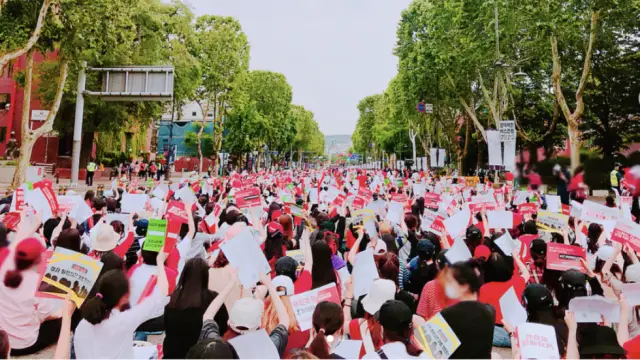On Saturday in Hyehwa, Seoul, a crowd estimated to be around 22,000 people gathered to become the biggest women’s rally in the history of South Korea. The march was advertised as the “Women March for Justice,” and its focus was to protest the rising problem of spy cam surveillance, specifically about a strange porn genre known as “molka.”
Molka is the result of hidden cameras being set up in public bathrooms, showers, trains, buses and other public areas where women could potentially be filmed and watched by others without their consent. The march on Saturday was intended not only to protest the bizarre new fetish but also to protest the lack of support and action for women’s rights by the Korean National Police Agency.
The protesters, the majority of whom were female, marched through the streets of Seoul, shouting and carrying signs with phrases such as “My life is not your porn.” Many protesters felt the need to protect their identity by wearing masks, while others felt empowered enough to show support for the cause by shaving their heads.
Saturday’s protest was the second time in the past month in which there has been a large protest of spy cams, but “Women March for Justice” was significantly larger, recorded as the biggest women’s rally South Korea has ever seen.
Molka has been an issue in South Korea for years, beginning in 2015, when footage from a women’s shower at a public bathroom was released online. In 2014, 18 cases were reported to the police each day, and 98 percent of the offenders were men. Although the issue isn’t new, a specific incident in early May is believed to have sparked the intense amount of protests.
Earlier last month, a woman in South Korea found herself being arrested after she spread a nude image of a man posing for an art class. She was immediately found by police, who not only arrested her but also humiliated and exploited her image to the public.
The incident was somewhat of a last straw, as many women viewed what happened as completely hypocritical and even insulting. Dozens of cases involving male perpetrators were ignored each day, but the one case involving a female perpetrator resulted in a quick arrest. Women considered such a reality completely unacceptable.
As a result of the incident and many others, thousands of women ultimately gathered to fight for their rights. Many other protests occurred over the weekend in South Korea against the meeting of President Trump and Kim Jong-un, but “Women March for Justice” was different.
Women in South Korea have been discriminated against for centuries, and the protest is a huge turning point in the battle which they have only just started.
Women’s marches have become much more prominent within the past few years, starting with the marches last January which garnered millions of supporters. Marches such as “Women March for Justice” provide a spotlight for the ongoing battle for women’s rights and the fire still burning in women — a fire which isn’t burning out until genuine equal rights are obtained.

















